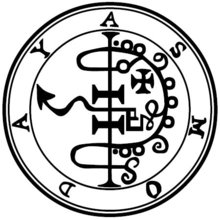Aeshma: The Destructive Demon
Aeshma is one of the demons mentioned in Zoroastrianism – an ancient Persian religion that was founded in the 7th century. This demon is known for his malicious and aggressive acts. He has no known physical form and his main intention is to destroy humanity. His epithet is “of the bloody mace.”
Other Names: Aesman, Xesm, Hēšm (hyšm) and Hāšem
Origin: Persian/Iranian
In Zoroastrianism, the Daevas are a class of demons that follows Angra Mainya. The three Daevas mentioned by the Gathas are Aka Manah, Druj, and Aeshma.
The Sigil of Aeshma
Who are the Daevas?
They are simply the various divinities of neighboring polytheisms. The word “daeva” can be translated as “wrong god”, “rejected god” and “false god”. This term is used in Hinduism, Jainism and Buddhism in reference to their divine gods.
The daevas sought to increase chaos, turmoil and deception. So, it is said that the worship of the daevas engendered the furtherance of Druj, as did the practice of Yatuik Dinoh.
The creator God, Ahura Mazda (later Ohrmazd), had created Sraosha to counter the mischief done by Aeshma and protect people from his attacks. So, it is said that Sraosha will ultimately overthrow Aeshma.
The Avesta’s picture of Aesma was provided in the Middle Persian Zoroastrian books. This picture emphasizes the attitude of fear and dread of the demon and his power. Aesma comes to the material world once on each night and according to the Legends, he is kept away by Sros.
Aeshma is opposed to Asha Vahishta, the Amesha Spenta, or good spirit, who embodies Truth. His chief adversary is Sraosha (Obedience), who is the principle of religious devotion and discipline.
Abilities:
Aesma was commissioned by Ahriman. He was given the seven powers which he uses to destroy humanity and every other creature. His work is to sow discord among men, and cause slaughter. He can even incite demons to fight among themselves.
Due to his seven powers, he is said to be immune to poisons, natural and magical lightning. Most aeshmas don’t use armor during their fights.
Due to his attitude, he is termed to be the opposite of Sros. He has a close association with Az, Waran, Lust, Desire and Heresy. Ahriman made him a commander of the East so that he could help Az. According to Zoroastrian sources, Aesma is one of the demons with the ability to assail the souls of the dead while they approach the Chinvat Bridge for Judgement.
In the Book of Tobit, Aesma occurred as Demon Asmodaios who was said to have slain each of the seven husbands of Sarah, the daughter of Raquel. He killed these men just before any of the marriages was consummated. Then finally, a day came when with the aid of the Angel Raphael, he was finally defeated.
Authority:
An aeshma is usually given the rank of commander or lieutenant with control over a battalion of lesser demons (usually vrocks or dretches).
The typical aeshma stands about 8 feet tall and weighs about 500 pounds. Together with his team, they are responsible for all the evil doings. They initiate strife, wars, and entice individuals into becoming morally corrupt. They can also make an individual sway away from his/her worship.
Working with Demon Aeshma
Aeshma is a strange-looking creature. His body and face are engraved with markings and with two wings sprouting out of his back. Jagged spikes also form out of the back of his wrists and this compliment the brutishness of his physique.
He possesses great amount of physical strength, durability and great flight skills. When he punches the ground, it results to powerful shockwaves and fissures.
The recitation of a prayer from the Vendidad can drive away Aeshma. The Vendidad is a collection of texts that enumerate the various manifestation of evil spirits and the different ways to confound them. The recitation of the Vendidad often requires a priest of higher rank.

